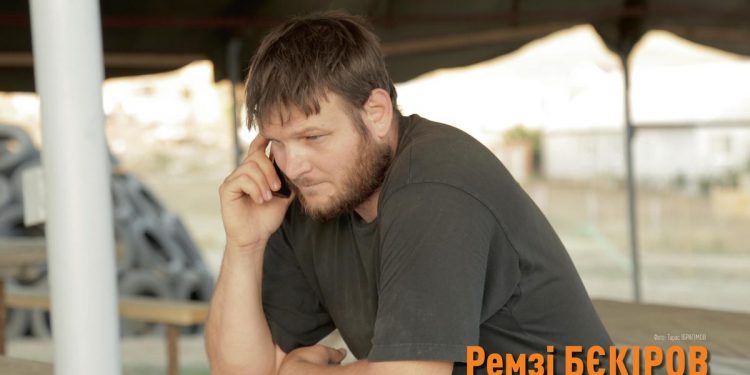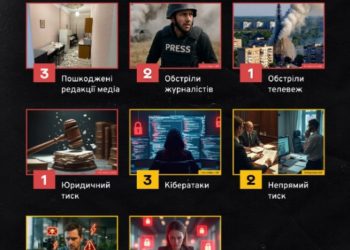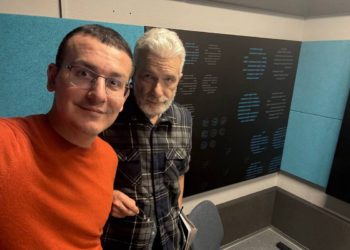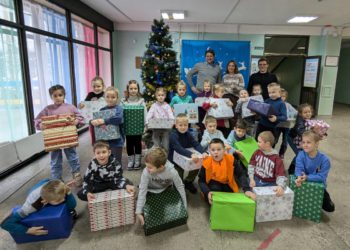The last word of the Crimean civil journalist in the Moscow Court of Appeal
The other day, the Military Court of Appeals in Moscow heard appeals against the sentence of Crimean Tatar activists from the “second Simferopol group” in the Hizb ut-Tahrir case. Remzi Biekirov is a correspondent of Crimean Solidarity and the online publication Grany.ru. Human rights defender Riza Izetov and Crimean Tatar activists Rayim Aivazov, Farkhod Bazarov, and Shaban Umerov are in his case. The defendants’ defense participated via video conference call from the Crimean Garrison Military Court. Earlier, the Southern District Military Court sentenced activists of Crimean Solidarity arrested in the case of the “second Simferopol group” of Hizb ut-Tahrir to 15-18 years in prison, as if “for participating in the activities of a terrorist organization and preparation of a violent seizure of power.” As earlier reported, Hizb ut-Tahrir is an organization banned in Russia since 2003. Still, it operates freely in Ukraine and other countries without restrictions at the level of national legislation.
Remzi Biekirov: In the four years that have passed since the day of our arrest, we managed to study our so-called criminal deeply, and, in fact, political case.
The conclusion we came to was repeatedly voiced in court: “the political order given from above was incompetently and haphazardly executed by the law enforcement officers who fabricated our criminal case.
To avoid being verbose, let’s consider the most prominent mistakes and violations committed by the investigative bodies that shaped the case.
From the moment of his return to his homeland until his arrest, 25 Crimean Tatars and Crimean Muslims lived in Crimea [Remzi means the Crimean Tatars who, along with him, go under in the falsified case – ed.]. They built houses, raised children and grandchildren, worked, and had great social connections. With the arrival of Russia in Crimea and the beginning of repressions against dissidents, these people did not remain aloof from the troubles that befell Crimeans. They started a peaceful resistance to the lawlessness of the authorities. Four became civil journalists; one became a human rights defender, and the rest were activists who helped political prisoners and their families. Like most Crimean Tatars, they gathered, talked, and prayed. Most of these twenty-five Muslims were activists of Crimean Solidarity, a peaceful initiative to protect people from the arbitrariness of special services.
Naturally, this cohesion and activity caused alarm among the authorities, which saw Crimean Solidarity as a threat to its planned work on educating the population in the spirit of the imperial policy being carried out. A signal was sent to the FSB that the activity of these people should be suppressed.
FSB operative Valiulin and his team were the first to undertake this task. He found out that our heroes sometimes gather in one of the buildings in Simferopol. Valiulin submits a request to the court to conduct an operational search operation in this house. A court under the control of security forces approved the surveillance of Muslims who gathered in one of the houses in Simferopol. It would seem that everything is fine, but the impunity and laziness of the entire judicial system led to a contradiction.
The address: Crimea, Simferopol, Kyivskyi District, ST Syhnal, street -2, building 44, which Valiulin asked to listen to and which the court permitted for, does not exist! A Kamiyankyi area of Simferopol with a similar address is located in a part of the city different from the Kamiyankyi Microdistrict. This did not stop the operative, who began tracking the non-existent address. When the defendants repeatedly showed the court this contradiction, provided an extract from the state register, and showed the house’s sale contract, Yandex.Maps and others, the court was adamant: since the FSB said this address is indicated in the case file, it is the truth. And we are not interested in the rest.
The proactive FSB operative began listening. What do you think the alleged terrorists were talking about? About explosions, terrorist attacks, seizure of power? No, it turned out to be much easier. Crimean Muslims talked about religion, history, politics, morality, and holding a future Islamic holiday for children. Did that stop Valiulin? No, he had the order to follow. As a result, the FSB operative recorded four meetings of Crimean Muslims about courage, the political vacuum, the situation of the Kurdish people, and the value of time. Operative Valiulin illiterately compiles transcripts of these meetings, interviews witnesses who appeared from nowhere, and the criminal case begins to gain momentum.
The baton was taken over from Valiulin by investigator S.V. Makhniov with his colleagues. March 27, 2019, became a black day in the history of Crimea. The FSB, together with OMON [special force troopers] and Rosgvardia [Russia’s national police], start their special operation to combat what they believe to be dissidents. As a result of searches in the houses of Crimean Muslims, they found a “terrible weapon” – books! Doesn’t it look like the novel Fahrenheit 451?
People in balaclavas kindly dropped them off for those who couldn’t find their books. No one could prove the forgery, particularly the elderly Dzhemil Gafarov, who has four witnesses who speak about the forgery of the literature and insists on conducting a dactyloscopy examination to prove his innocence. Neither the investigators nor the court heard him. Gafarov, a Group II disabled person, was sentenced to 12 years in prison to die. After the verdict, my friend did not live long. His body could not withstand the prison torture!
Searches are also of interest. Many detainees had documents sent to the wrong address. It was later called a “technical error” by the court. So, for example, the neighboring house is indicated in the protocol against Seitveli Seitabdiev. As for Rustem Seitkhalilov, they wrote: “search the second house to the right of the intersection with Almazarska Street.” Although Rustem’s house is the seventh from the left. Medzhit Abdurakhmanov was also searched at a non-existent address: Strohanivka, Marshrut Street, building 33, although Medzhit lives elsewhere. But who was stopped by that fact? That’s right, no one! Neither the investigation, the prosecutor’s office, nor the court saw anything contradictory in this information.
After collecting all the so-called “evidence”: wiretapping, books, the testimony of hidden witnesses, etc., investigator Makhniov adds all this to the criminal case. But even here, the investigation made a fatal mistake: during the review of the “evidence,” a minor witness, Khorolskyi, was present, which makes this entire procedure illegal from the point of view of the Criminal Procedure Code. But when did the law stop the political order? Despite the apparent violation and essentially the invalidity of the entire part of the case, where a minor witness was present, the prosecutor’s office and the court were as blind as the statue of Themis.
The next stage of falsification was examinations. Here the number of contradictions is staggering. First, the illiteracy of the expert linguist is surprising! Having received the transcript compiled by the FSB with thousands of errors, the expert ignored them, although he should have indicated these errors in his examination. So, for example, “tawakul” – hope in Allah – became “karakult” with a light sketch of Valiulin and later the expert. “The creation of the Rojava region” became the “creation of the Rojava legion.” The expert corrected the quote “the uprising was suppressed” to “the uprising was crushed.” And many other spelling and punctuation errors.
Secondly, there is an apparent contradiction in the dates of the examinations, which the court, as usual, called a “technical error.” According to the case file, on November 25, 2019, experts requested transcripts of the wiretapping from the FSB. On December 13, 2019, investigator S.V. Makhniov sent what the experts asked him. Everything would be fine, but on December 7, 2019, the examination had already been completed. So, the transcripts were sent a week after the end of the examination!?
Thirdly, expert religious scholar I.A. Mukhammedzaripov performing an examination often uses such a concept as “specific terms,” which, according to the expert’s logic, prove the involvement of those who uttered them in a terrorist organization. The pseudo-expert was denied by a specialist with 30 years of experience Radyvyliv, who said in an independent study: “We come across a number of terms that are widely represented in the general Muslim discourse, for example, dawat, jihad, mujahid, kufr, kyafir, as well as Arabic vocabulary of a sociopolitical and sociocultural nature. For example, Caliph, Caliphate, Hizb, Mushrif, Amir, Daris, and Halaka. The court repeatedly stated that using any terms does not indicate belonging to certain organizations. If, for example, a person uses the term “communism,” this does not mean he or she is committed to the Communist Party. It will take a long time to list all the blunders of examinations so that we will limit ourselves to the most striking ones.
An expert bomb technician did the photo-portrait examination; the photographic examination showed signs of assembly, all examinations were conducted in sub-departmental FSB structures, and much more.
Hidden witnesses are also untrustworthy. These people, unfamiliar with any of the defendants, said only what the customer needed. So, for example, when the investigation required that Rayim Aivazov was a member of a terrorist organization, the witnesses spoke about it. When Rayim gave up his first testimony, which was given under the pressure of the FSB, as revenge for this investigation, the charges intensified. He turned from a participant into an organizer. The witnesses at the court changed clothes because the prosecutor had to confirm the version of the FSB, although recently, they said otherwise. Such contradictions are significant.
The court forbade prying into the personal data of covered-up witnesses, although they could say anything. They did this, telling the court that 25 Crimean Muslims were planning to seize power in the Russian Federation. What a five-year-old child would not believe, the court put as the basis of the verdict, sentencing 25 people to 12-19 years! The fact that no weapons, schemes, plans to seize administrative buildings or connections with politicians and the military were found on the defendants did not confuse the court, as well as the fact that all real, not unclear, defense witnesses said that the defendants were exemplary Muslims who lead a peaceful lifestyle.
In the verdict, judge O.V. Volkov writes: “The assertion of the defense about the non-involvement of the defendant’s actions, which are incriminated against them, related to acts of terrorism, the use of violence, the illegal circulation of weapons and ammunition, explosive substances and explosive devices… do not affect the legality and reasonableness of bringing the defendants to criminal responsibility for incriminated offenses.”
So much I want to tell the court: “If we are not terrorists, did not commit or prepare terrorist attacks, why are you judging us?”
Our court resembles the trial of the famous designer Serhii Koroliov. The reason for the accusation of the great scientist was a rebuke, possibly the same as in our case. He was accused of dismantling the plane. Koroliov asked the investigator to go to the university’s yard, where he works, and make sure that this plane is safe and sound. Koroliov was refused, saying that in the papers, it was written that he broke it. The scientist was sent to Magadan.
Summarizing all of the above, I would like to state the following:
Our criminal case is politically motivated, illegal, and fabricated! Since we were arrested and to this day, we have felt the violation of both international and national legislation. An unverified piece of paper, “the decision of the Supreme Court of 2003,” mysterious witnesses who cannot be verified, and their secrecy has changed to faith, books as evidence of terrorism, illiterate experts, ready to prove anything to the agreement of their masters, a whole pile of legal rubbish, certificate-memorandums, information about the connection of subscribers and much more – all this has nothing to do with the evidence to accuse us of such a terrible crime as terrorism and violent seizure of power. This is just an imitation of the activity of the FSB workers, which requires anti-terrorist and anti-extremist legislation to repress dissidents.
Ramzi Biekirov,
A correspondent of Crimean Solidarity
and Grany.ru online publication

 THE NATIONAL UNION OF
JOURNALISTS OF UKRAINE
THE NATIONAL UNION OF
JOURNALISTS OF UKRAINE








![International Media Organizations: peace plan mustn’t envision amnesty for crimes against journalists 9 Ukrainian flag on Independence Square [Maidan Nezalezhnosti] in Kyiv, Ukraine (archive image). EPA-EFE / Oleh Petrasiuk](https://nuju.org.ua/wp-content/uploads/2025/12/maidan-flag-yezhak-2022-120x86.jpg)







Discussion about this post